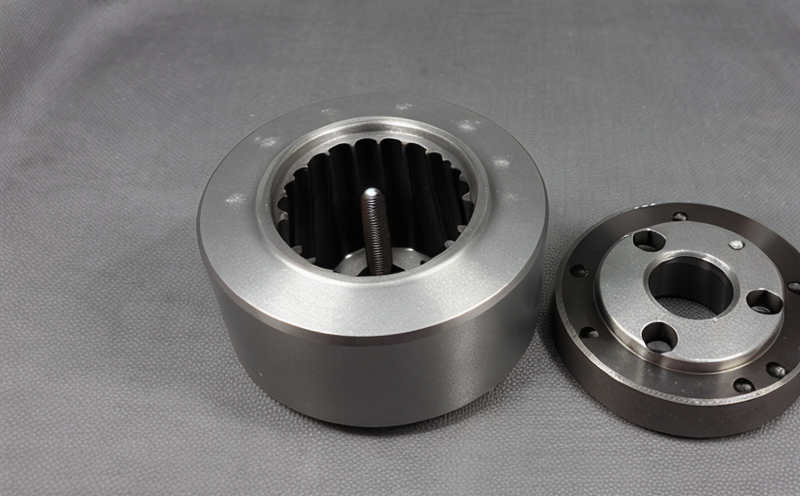ASTM E1820 Fracture Toughness Testing of AM Alloys
The ASTM E1820 standard provides a comprehensive framework for determining the fracture toughness (KIc) of materials, including advanced manufacturing alloys produced through Additive Manufacturing (AM). This service is pivotal in ensuring that AM parts meet stringent quality and safety standards. Fracture toughness testing is essential to evaluate the material's resistance to crack propagation under stress. In the context of AM alloys, this test helps identify any inherent weaknesses or flaws that could lead to premature failure.
Fracture toughness is a critical property for materials used in high-stress environments, such as aerospace and automotive components. The ASTM E1820 procedure involves several steps, including specimen preparation, testing under specified conditions, and data analysis. Specimens must be carefully machined or printed to ensure they meet the required dimensions and surface finish. This service ensures that each test adheres strictly to these standards.
The importance of fracture toughness cannot be overstated in AM alloys where material defects can significantly impact performance. By conducting ASTM E1820 tests, manufacturers can ensure their products are reliable under real-world conditions. The results provide valuable insights into the material's mechanical properties and help guide process improvements.
Advanced manufacturing techniques like laser powder bed fusion (LPBF) or electron beam melting (EBM) introduce unique challenges in ensuring product quality. Fracture toughness testing is particularly important for these processes due to the complex microstructures formed during AM. This service ensures that the final products are robust and free from defects that could compromise safety.
ASTM E1820 compliance also aids in regulatory approval, allowing manufacturers to meet stringent industry standards. For instance, aerospace companies must demonstrate compliance with FAA regulations, which often require fracture toughness testing as part of their certification process. By offering this service, we help ensure that our clients' products meet these rigorous requirements.
In summary, ASTM E1820 fracture toughness testing is a cornerstone of quality assurance in the AM industry. It provides critical data on material performance and helps manufacturers produce reliable parts. This service ensures that every test conducted adheres to the highest standards, giving peace of mind to our clients about their product integrity.
Applied Standards
The ASTM E1820 standard is widely recognized for its rigorous testing procedures and stringent acceptance criteria. This service strictly follows these guidelines to ensure accurate results. The procedure involves several key steps, including specimen preparation, crack initiation, stress application, and data analysis.
- Specimen Preparation: Specimens are carefully machined or printed using AM techniques to meet the required dimensions and surface finish.
- Crack Initiation: The test involves creating a controlled crack on the specimen's edge. This step is critical as it sets the initial condition for fracture propagation.
- Stress Application: Stress is applied gradually until the specimen reaches its failure point. This process helps in determining the KIc value, which indicates the material's resistance to crack growth.
- Data Analysis: The test results are analyzed using specific formulas provided by ASTM E1820. These calculations provide a clear measure of fracture toughness.
The standard also specifies the acceptance criteria for KIc. Specimens must meet these criteria to pass the test, ensuring that they are fit for their intended applications.
Benefits
- Informed Decision-Making: Test results provide critical data on material performance, guiding process improvements and quality control.
- Regulatory Compliance: Ensuring ASTM E1820 compliance helps manufacturers meet stringent industry standards and regulatory requirements.
- Risk Reduction: Identifying potential weaknesses in AM alloys through this test reduces the risk of product failure in high-stress environments.
- Enhanced Product Quality: By adhering to ASTM E1820, manufacturers can produce reliable parts that meet high-quality standards.
The benefits extend beyond mere compliance. This service also enhances a company's reputation for quality and reliability, which is essential in competitive markets. By offering this service, we help our clients stay ahead of industry trends and ensure their products are fit for purpose.
Competitive Advantage and Market Impact
The ability to conduct ASTM E1820 fracture toughness testing provides a significant advantage in the competitive materials testing market. By ensuring that each test adheres strictly to the highest standards, we help our clients produce reliable products that meet or exceed industry expectations.
Market impact is another key benefit of this service. By providing accurate and consistent results, we contribute to the overall quality assurance efforts within the AM industry. This, in turn, helps drive innovation and trust among consumers and stakeholders.
In conclusion, ASTM E1820 fracture toughness testing is not just a compliance requirement but a strategic investment in product reliability and market reputation. By offering this service, we help our clients stay competitive and meet the evolving demands of their industries.





